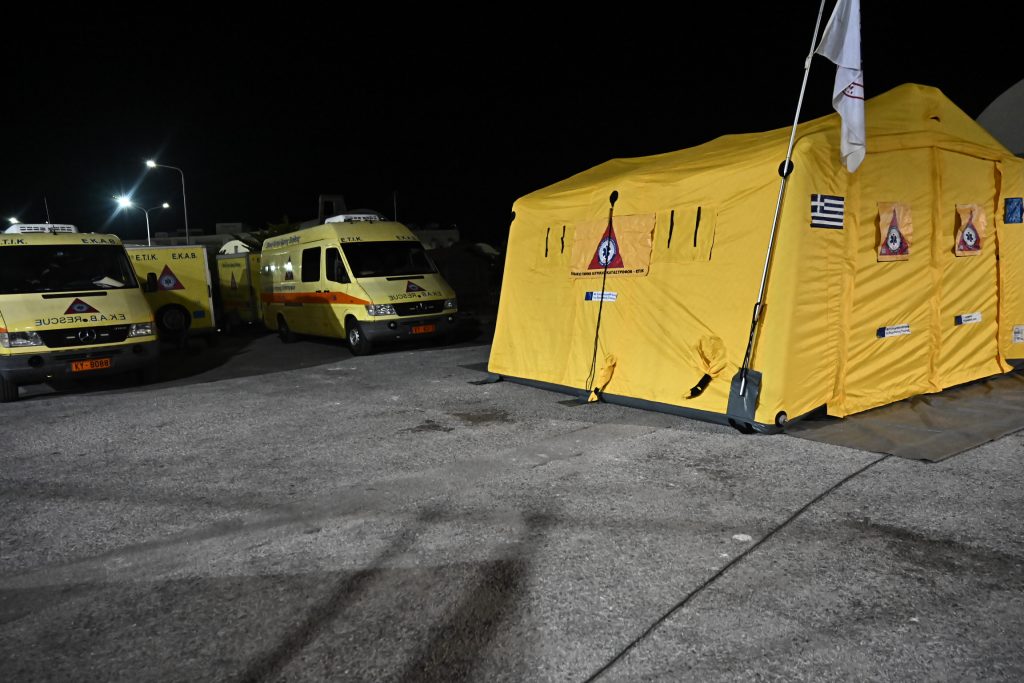Greece’s iconic island of Santorini has been experiencing unprecedented seismic activity, with thousands of earthquakes shaking the sea bed in the Cyclades continuously. While the islanders are familiar with geological unrest, the frequency of the tremors and the constant threat of a major quake have left residents in a prolonged state of unease.
The Far-Reaching Impact of Earthquakes
Studies have shown that the impacts of an earthquake are multifaceted and can be long-term. Beyond the immediate loss of human lives and the destruction of homes and infrastructure, earthquakes often also lead to the disruption of economic activity and the social life of local communities. What is often overlooked, however, is the impact seismic events can have on people’s mental and psychological health.

Στιγμιότυπα από την Καλντέρα στην Σαντορίνη, Δευτέρα 2 Φεβρουαρίου 2025 (ΦΩΤΟΓΡΑΦΙΕΣ ΑΡΧΕΙΟΥ ΤΑΤΙΑΝΑ ΜΠΟΛΑΡΗ/EUROKINISSI)
Earthquakes are unpredictable and living with them can be a stressful and intense experience. They instil a sense of helplessness in people, along with fear and uncertainty, especially in areas with a history of seismic activity like Santorini, where residents live their entire lives in the shadow of the next strike.
The Mental Toll of Chronic Stress

(ΚΩΣΤΑΣ ΤΖΟΥΜΑΣ/EUROKINISSI)
Psychiatry Professor Antonios Dakanalis, an internationally prominent figure in the field of mental health, told To Vima International Edition that chronic stress impacts the brain, leading to psychological and cognitive disorders including anxiety, depression, nervous tics, and phobias. The professor explained that the greater the changes a person experiences in their life, and the less control they feel they have over their circumstances, the more stress they will endure and the greater the risk of their developing psychological disorders.
Physical Symptoms of Stress in Santorini Residents
Dakanalis explained that any significant change in people’s daily lives requires the mobilization of physical, mental, and emotional reserves, leading to what is commonly called “stress.”
When stressors accumulate over a short period of time, people become more vulnerable to physical illness, mental disorders, and even accident-related injuries, the professor noted. Many Santorini residents have reported experiencing headaches, nausea, dizziness, and difficulty breathing—physical symptoms that have been directly linked to the over twenty thousand earthquakes that have shaken the island since late January.
Studies attributing such symptoms to earthquakes have also been documented in other seismic-prone regions. A study carried out in Japan following the double mega quakes of 6.5 and 7.3 on the Richter scale and hundreds of aftershocks that hit Kumamoto in 2016 identified these symptoms as Post-Seismic Dizziness Syndrome. According to the study, 42% of the residents who participated in the study reported experiencing vertigo and nausea after the quakes.

(ΚΩΣΤΑΣ ΤΖΟΥΜΑΣ/EUROKINISSI)
A Unique Situation: Waiting for a Disaster that May Never Come
However, what Santorini is experiencing is unique, said the professor. The disaster has not occurred yet—hopefully it never will—, but the continuous and prolonged seismic activity is keeping residents in a state of constant anticipation and anxiety. The ongoing sense of threat is making the situation even more distressing, and repeated, persistent, and intense stress takes a significant toll on people’s mental health.
“When something bad happens, people eventually come to terms with it and reorganize their lives, with greater or lesser difficulty. However, the constant uncertainty about the future, plus the prolonged state of alertness keep the population on edge, leading to both physical and mental exhaustion,” highlighted Dakanalis.
Having a sense of control over events helps reduce their impact, but earthquakes are unpredictable by nature. The professor explained that “Under continuous stress, the human brain functions like a car with its hazard lights permanently on—eventually, the battery runs flat. Human resilience collapses in the same way, with psychosomatic illnesses the result”.
Vulnerable Populations at Higher Risk
In the aftermath of natural disasters, individuals remain under pressure for an extended period. The extent to which individuals are affected by natural disasters like earthquakes depends largely on their personality and the personal and social resources available to them. Children, the elderly, lonely and introverted individuals, people with disabilities, and anyone with pre-existing physical or mental health conditions are more vulnerable, as are people with limited financial resources, plus women and girls, Dakanalis explained.
According to research, between 33% and 50% of those affected by a natural disaster will develop depression, anxiety, or Post-Traumatic Stress Disorder (PTSD)—conditions which manifest themselves in nightmares, prolonged distress, and sufferers reliving the traumatic events over and over in their minds.
Community Support for Psychological Resilience
Community support and social cohesion play a crucial role in reducing the psychological impacts of repeated seismic activity, as they provide a network of solidarity, safety, and psychological resilience or adaptation.
Research shows that factors such as the severity of personal loss, the time required to recover and return to daily life, and the perceived inefficacy of the assistance on offer increase distress.
When residents receive clear, practical, and non-contradictory instructions from the authorities on how to protect themselves, when they see preparedness at the community level, and when daily life goes on as normally as possible, they develop a sense of control over the situation. The reassurance that they are not facing the crisis alone can reduce stress significantly.
In addition, the breakdown of public order, which could lead to theft, looting, and sexual violence both during an evacuation of the island and in the aftermath of a natural disaster, is a significant risk, the professor warned. To mitigate this, effective policing measures must be put in place.

The Importance of Psychological Support
Deploying psychological support teams is essential. Simply listening can sometimes be more valuable than giving advice. But listening involves more than simply hearing words; we must also understand what the other person is expressing and try to grasp how they feel, the psychiatrist explained.
People must be encouraged to express their emotions and to acknowledge them. They need reassurance that the anger, sadness or fear they are feeling are completely natural responses to the unnatural upheaval of nature, concluded the professor.






